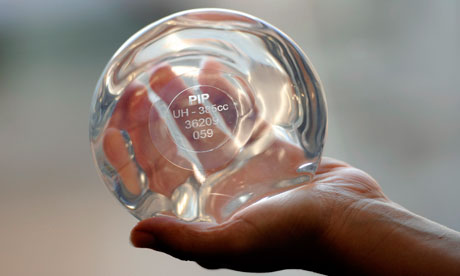
MPs are highly critical of the regulators and private cosmetic clinics that took nearly two years to warn more than 40,000 women that the breast implants they received were substandard.
In a report following an inquiry into the PIP breast implants scandal, the Commons health select committee said it was only when the problems with the implants hit the headlines last December that most women who had them became aware of the issue – 21 months after the Medicines and Healthcare Products Regulatory Authority knew they were substandard. The implants contained industrial grade silicone intended for mattresses.
"The action taken to communicate with affected women after March 2010 was inadequate," says the report. MPs did not feel that the MHRA had done enough simply by notifying the clinics.
"The committee recognises that private clinics had a duty to contact their patients directly, but the MHRA and the Department of Health also had a duty to raise public awareness," it says.
Nor were MPs happy with the response of the head of the MHRA, Sir Kent Woods, when asked if any PIP implants could have been used in surgery after March 2010. Woods said in evidence that he could not give the committee an assurance that no more were implanted. "One sincerely hopes that it did not happen," Woods told MPs.
"'Sincere hope' is not an adequate basis for regulation," says the report. "There needs to be a more reliable method of communicating medical device alerts to the private sector that requires a positive response that the instruction has been received and acted upon."
Women who need implants removed, but whose private clinics refuse to help, have been offered surgery on the NHS, but not replacement of the implant.
The committee is recommending that women should be allowed to pay the NHS to have a replacement as well as removal of their implant. Having one operation, rather than a removal on the NHS and then a replacement in the private sector, would be better for the women's health.
"Removal should be free. Replacement, if it is carried out by the NHS, should be a charged-for service," said Stephen Dorrell, the Conservative chairman of the committee. The NHS would require the woman to pay the additional cost of replacement, while it would attempt to recoup the cost of removal from the private clinic that did the original operation.
"Women are torn now because the NHS offer only includes removal and not replacement," said Labour MP and committee member Barbara Keeley. "It is a very important issue that needs to be sorted."
The vast majority of women with PIP implants – made by the French company Poly Implant Protheses, which has now gone into liquidation while its owner is in prison awaiting trial – had them in private cosmetic clinics. These made up at least 37,000 out of the total of more than 40,000. There will be concerns that offering replacement as well as removal in the NHS will impose a burden on the health service, but the committee believes it is the right thing to do. "It is not reasonable to expect women to have to go through two procedures," said Keeley.
The report notes a letter in February from Pierre Guillot, managing director of the Harley Medical Group to NHS medical director Sir Bruce Keogh, in which Guillot wrote that his surgeons had "noticed phenomena that they never observed with other implants", including pus, redness and lumpy granular tissue, silicone in lymph nodes and milky secretions even in implants that had not ruptured.
Any such evidence should be carefully investigated, says the report, because it could be a reason to recommend early removal – which is not the case at the moment.
Rosie Cooper, a Labour member of the committee who is also chair of Liverpool women's hospital NHS trust, said she was concerned that private clinics and the surgeons who worked for them had not obtained informed consent from women before their operations. The women were not told which implants they had been given; nor were they told that all implants have a limited lifespan and normally have to be replaced after around 10 years.
"It is not acceptable and it is not professional," she said. "The General Medical Council should act and the Care Quality Commission should go into these private companies and see what records they are keeping."

